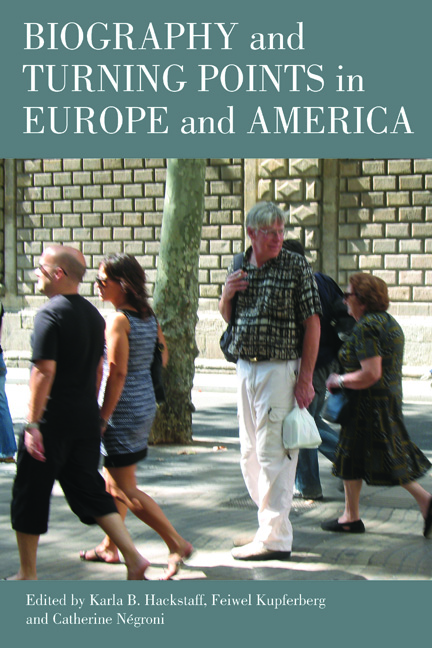Book contents
- Frontmatter
- Contents
- Notes on contributors
- Introduction: Advancing the dialogue on turning points
- one Unpacking biographical narratives: investigating stories of artistic careers in Northern Jutland, Denmark
- two Turning points in the life course: a narrative concept in professional bifurcations
- three Conjugal separation and immigration in the life course of immigrant single mothers in Québec
- four Migration biography and ethnic identity: on the discontinuity of biographical experience and how turning points affect the ethnicisation of biography
- five Biographical structuring through a critical life event: parental loss during childhood
- six Decisive turning points in life trajectories of violence among young men in the barrios of Caracas: the initiation and biographical reconversion to non-violent lifestyles
- seven The turning points of the single life course in Budapest, Hungary
- eight Complicating actions and complicated lives: raising questions about narrative theory through an exploration of lesbian lives
- nine Religious conversion as a biographical turn/ing: the case of Orthodox believers in contemporary Russia
- ten Conclusion: theorising turning points and decoding narratives
- Index
seven - The turning points of the single life course in Budapest, Hungary
Published online by Cambridge University Press: 01 September 2022
- Frontmatter
- Contents
- Notes on contributors
- Introduction: Advancing the dialogue on turning points
- one Unpacking biographical narratives: investigating stories of artistic careers in Northern Jutland, Denmark
- two Turning points in the life course: a narrative concept in professional bifurcations
- three Conjugal separation and immigration in the life course of immigrant single mothers in Québec
- four Migration biography and ethnic identity: on the discontinuity of biographical experience and how turning points affect the ethnicisation of biography
- five Biographical structuring through a critical life event: parental loss during childhood
- six Decisive turning points in life trajectories of violence among young men in the barrios of Caracas: the initiation and biographical reconversion to non-violent lifestyles
- seven The turning points of the single life course in Budapest, Hungary
- eight Complicating actions and complicated lives: raising questions about narrative theory through an exploration of lesbian lives
- nine Religious conversion as a biographical turn/ing: the case of Orthodox believers in contemporary Russia
- ten Conclusion: theorising turning points and decoding narratives
- Index
Summary
Introduction
This chapter examines the specific phases and turning points of the life course that can influence the decision of young people to choose singleness as a way of life or become single by virtue of structural conditions. The research focused on a group of young, urban singles from Budapest. Singles are understood as those young adults at an age (25–40) typically devoted to family, living alone in their own household and having neither a durable partnership nor children. The population I studied was that of urban singles in their thirties from the upper social strata, having (at least) a university degree and being active in the labour market. Turning points, these life course crucial events, have a narrative status. The ontological status of narrated life events is unclear, as events themselves might be ‘constructed’ through narration. It is by no means an aim of this study and of sociological analysis in general to reveal and to denounce such constructionism. Given the centrality of narrativity in the reflection on and/or construction of crucial life course events, this study takes up the narrative analysis tradition of sociological research, this being used as an heuristic tool to better understand the individual history of singleness. The methodology used for this empirical research was conducting life course interviews, and based on this, working with the discourse analysis as a tool for analysing narration. I conducted interviews with a population of 15 Hungarian singles, eight women and seven men. Among Hungarians, young urban professionals are those who are most ‘individualised’ and open to the alternative ways of life, such as cohabitation and singleness.
In this chapter, I argue that even though conventional turning points are less structurally facilitated in Hungary, and establishing a family is often hindered by poor housing and financial conditions (Spéder, 2005), culturally the support for conventional turning points remains, even for those who are single. Singles themselves have a high regard for family life.
Experiencing a turning point is often perceived as an individual issue. However, there are some common features and types to be identified. I did not employ an individual perspective, but rather constructed typologies and inquired about the common aspects of some important life occurrences, which to some extent explained the decision for singleness.
- Type
- Chapter
- Information
- Biography and Turning Points in Europe and America , pp. 167 - 186Publisher: Bristol University PressPrint publication year: 2012

